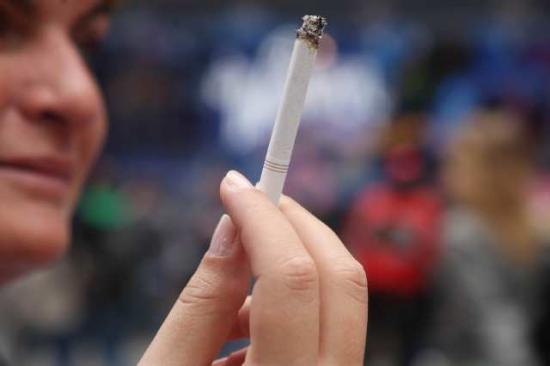孕妇吸烟容易引发流产、早产以及新生儿体重过轻。一项最新研究表明,女性吸烟还会使新生儿出现出生缺陷的风险增加,如心脏缺陷、肢体残疾和腭裂等。

据《洛杉矶时报》12日报道,英国伦敦大学学院的研究人员日前发表论文说,他们调查了过去50年来有关吸烟和新生儿出生缺陷的研究。结果发现,女性吸烟会使孩子出生时出现颅骨缺损的风险增加33%,出现畸形足的风险增加28%,出现腭裂的风险增加28%,出现肠胃缺陷的风险增加27%,出现肢体缺失或畸形的风险增加26%,出现心脏缺陷的风险增加10%,出现腹裂的风险增加50%。
研究人员呼吁说,为了防止新生儿出生缺陷,正在计划怀孕或已经怀孕的女性烟民应该立即戒烟。女性吸烟会使胎儿受到尼古丁、二氧化碳和焦油等一系列有害化学物质的伤害,这些有害物质会影响胎儿的发育。
2009年世界烟草大会发布的统计数据表明,全球约有2.5亿妇女吸烟,而且这一数字仍在快速增长。
生物探索推荐英文原文:
Smoking during pregnancy increases the risk of a wide range of birth defects, major study finds
Smoking during pregnancy increases the risk of a wide range of birth defects, including skull defects, missing or deformed limbs, clubfoot, cleft palate, protrusion of the gastrointestinal system through the skin and heart problems, according to the first major study to examine the incidence of such risks.
Smoking during pregnancy is already well known for increasing the risk of miscarriage, low birth weight and premature birth, said Dr. Allan Hackshaw of the University College London Cancer Institute, who led the study, published in the journal Human Reproduction Update. But "very few public health educational policies mention birth defects when referring to smoking and those that do are not specific — this is largely because of past uncertainty over which ones are directly linked," he said in a statement. "Now there is evidence," said Dr. Michael Katz, senior vice president for research and global programs of the March of Dimes.
Precise numbers for birth defects are somewhat difficult to come by. A University of Kansas Medical Center website says 3% to 5% of U.S. infants have a congenital anomaly at birth. A study by the Environmental Protection Agency conducted during the early 2000s found that the incidence among white infants was 1.0%, while the rate among black infants was 1.3%. The most common birth defect in that study was heart defects, which account for about one in every eight congenital problems. Each year in the United States, at least 120,000 infants are born with major structural abnormalities, according to the March of Dimes.
Despite the well-known problems associated with tobacco use, a surprising number of women still smoke during pregnancy. In the United States, the March of Dimes says, about 20% of women do so, with the highest rate among pregnant teenagers and the lowest rate among women over 35. Poorly educated and economically disadvantaged women are more likely to smoke than those with higher educations and better jobs. In Britain, Hackshaw said, 17% of pregnant women smoked, including a "staggering" 45% of those under age 20.
Hackshaw and his colleagues surveyed the medical literature for the last 50 years looking for studies that examined smoking and birth defects. They ultimately isolated 172 reports that, collectively, found 173,687 infants born with birth defects and 11,674,332 healthy controls. Analyzing the data, they found:
-- A 33% increased risk of skull defects.
-- A 28% increased risk of being born with a clubfoot.
-- A 28% increased risk of cleft lip or cleft palate.
-- A 27% increased risk of gastrointestinal defects.
-- A 26% increased risk of missing or deformed limbs.
-- A 10% increased risk of heart defects.
-- A 50% increased risk of gastroschisis, in which parts of the stomach or gut protrude through the skin of the abdomen.
The study did not examine how smoking creates these problems. But cigarette smoke contains as many as 4,000 different chemicals, many of which could be teratogenic, meaning they could interfere with the development of a fetus. Moreover, smoking and the carbon monoxide in smoke both constrict blood vessels, impairing circulation and potentially limiting the supply of oxygen to the fetus.
"Now we have this evidence, advice should be more explicit about the kinds of serious defects ... that babies of mothers who smoke during pregnancy can suffer from," Hackshaw said. "The message from this research is that women should quit smoking before becoming pregnant, or very early on, to reduce the chance of having a baby with a serious and lifelong physical defect."







